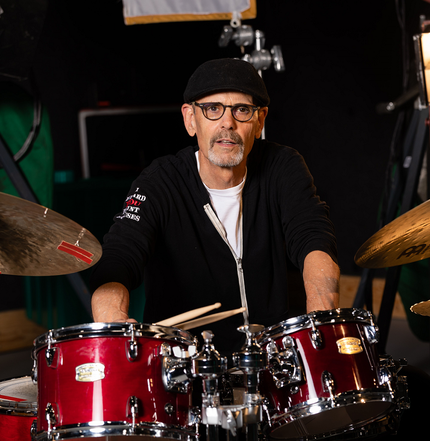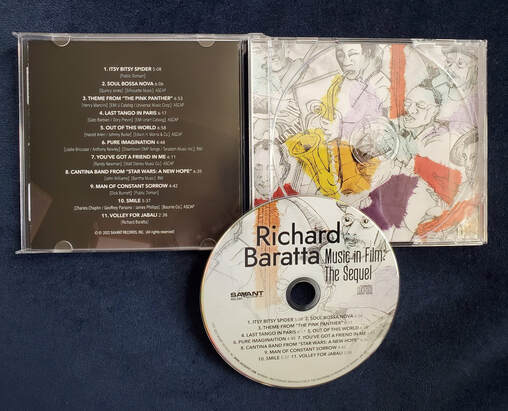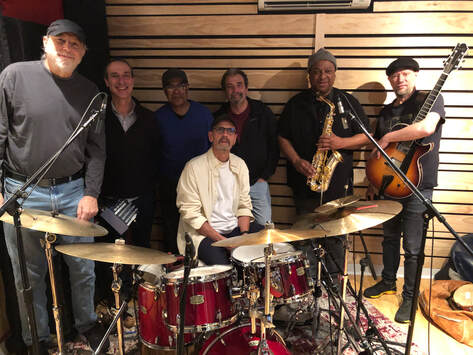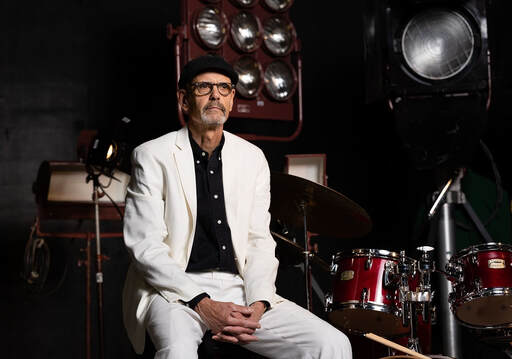JUNE 2023: Featured Artist
One Man's Journey from Music to Film and Back
Grammy-Nominated Jazz Musician & Prolific Film Producer:
Richard Baratta
|
Richard Baratta
Photo Credit: Anna Yatskevich |
Grammy-nominated Richard Baratta was born into a musically oriented family in Poughkeepsie, New York, in 1950. He began his musical journey at age 12, playing saxophone, flute and drums, and eventually, exclusively drums.
After earning a bachelor’s degree in history from Wagner College in 1973, and after studying with Jack DeJohnette, Bob Moses and Steve Haas, he moved to New York City in 1975 to pursue his musical career. From 1975 to 1984 Richard played gigs and recorded in and out of New York City. In 1984, Baratta decided to dramatically alter paths and pursued a career in movie production. Since working on his first film, Desperately Seeking Susan (1984), Richard has worked on over 50 movies, first as a location manager, then unit production manager, and for the past 15 years, as a co-producer and executive producer. A small sampling of his filmography includes: Joker, Martin Scorsese’s The Irishman, Dr. Strange, The Wolf of Wall Street, five Spiderman movies, Taking Pelham 123, Donnie Brasco, Working Girl, Big, and many others. The past 35 years of movie making never prevented Richard from regularly listening to and attending music events and concerts. He maintained relationships with his past bandmates and kept abreast of the happenings in the jazz scene. However, except for an occasional gig, he essentially remained on the sidelines. An opportunity in 2016 changed everything. He began performing music again, while continuing to produce films. |
He has since played with Eric Alexander, Vincent Herring, Walter Blanding, Craig Handy, Marcus Printup, Bruce Harris, Gerald Cannon, Bill O’Connell, Emmett Cohen, Jeb Patton, Steve Ash, Chris Pattishal, Mike LeDonne, Ray Gallon, Dave Kikoski, Danny Nimmer, Jerry Weldon, Rogerio Bocatto, Paul Bollenback, Dave Stryker, John Patitucci, Mike Goetz, Essiet Essiet, Yoshi Waki, and others.
Richard’s album Music in Film: The Reel Deal (Savant Records) included the track “Chopsticks,” which received a Grammy nomination. Music in Film: The Sequel (Savant Records) was released in September 2022. Stay tuned for his new album release (planned for August '23).
Richard currently resides in Tenafly, New Jersey. He has been leading his two bands, the Gotham City Latin Jazz Septet and The 3B’s Plus 2, performing in jazz clubs and at concerts and music festivals.
Richard’s album Music in Film: The Reel Deal (Savant Records) included the track “Chopsticks,” which received a Grammy nomination. Music in Film: The Sequel (Savant Records) was released in September 2022. Stay tuned for his new album release (planned for August '23).
Richard currently resides in Tenafly, New Jersey. He has been leading his two bands, the Gotham City Latin Jazz Septet and The 3B’s Plus 2, performing in jazz clubs and at concerts and music festivals.
Myrna Beth Haskell, executive editor, spoke with Richard about his journey back to music, the joy of performing, and balancing work and family responsibilities.
Your first love was music. What drew you to jazz and your focus on drums after being exposed to other instruments?
I actually started loving jazz when I was like 11 or 12 years old. The Beatles were really popular back then. I liked the Beatles – I mean, who didn’t like the Beatles? But I liked John Coltrane and Dave Brubeck and Miles Davis more. I started hanging out with others who really liked jazz, and we became good friends and fed off each other.
I liked to play the saxophone, and I played a little flute; for some reason, though, I got drawn to the drums. I felt the rhythm more there.
And family members shared your love of music, right?
My brother played drums, my dad was a pianist, and my mother sang opera.
Your first love was music. What drew you to jazz and your focus on drums after being exposed to other instruments?
I actually started loving jazz when I was like 11 or 12 years old. The Beatles were really popular back then. I liked the Beatles – I mean, who didn’t like the Beatles? But I liked John Coltrane and Dave Brubeck and Miles Davis more. I started hanging out with others who really liked jazz, and we became good friends and fed off each other.
I liked to play the saxophone, and I played a little flute; for some reason, though, I got drawn to the drums. I felt the rhythm more there.
And family members shared your love of music, right?
My brother played drums, my dad was a pianist, and my mother sang opera.
Performing in Trenton, New Jersey (2022)
Video Courtesy: Richard Baratta
Video Courtesy: Richard Baratta
What do you specifically love about this style of music?
Jazz is improvisational. That’s a key aspect of it. With classical music, it’s less creative. You’re reading the notes on the page and playing the music of a specific composer. So, if you’re a creative person, you love jazz because you want to play your own way. There’s a melody and a structure there, but once you’ve played it once or twice, you’re on your own. You listen to each other and play off each other – there’s a lot more freedom there.
You took a long hiatus from the music industry while your career in films blossomed, but you kept your toe in the pond.
I listened to music a lot while making movies. I kept up on it – but not the playing part as much, though...I maybe had a gig once a year. It’s very difficult to serve two masters.
How did you fall into film production?
I was very lucky, but I was also very persistent.
A good friend of mine moved in next door – I had a loft on 16th Street, right off 5th Avenue. At the time, my friend was a location manager for Woody Allen. I would go once in a while to the movie sets he was working on, and he would come see me play. I always loved movies. In the summer, I’d go see double features at the movie theater [in the afternoon hours] because I couldn’t afford air conditioning – the loft was just too big.
At one point, I really needed to make money. I wanted to get married [Richard’s wife, Jill, is a fine artist who has created artwork for his albums], and I wanted to have a family, too. But I didn’t think I was going to be able to do that comfortably the way my life was going in the music business. So, I kept asking and asking my friend if he could get me a job working on a film. Finally, a good friend of his (who was a producer) suggested I take a job as a location scout for a movie [the movie was Desperately Seeking Susan]. It was filmed on the Lower East Side, which I knew like the back of my hand because I worked as a bartender two days a week down there for extra money. I didn’t know what I was doing, but they had patience with me. When it was over, people asked me if I’d continue to do it. I said no. It was horrible! You had to get up at 4:30 a.m. I was used to getting home at 4:30 a.m. It was culture shock for me.
But then, I got a call about a movie Brian De Palma was doing called Wise Guys. The person who called told me they heard I was a good scout and had some work. They told me they’d give me $75 a day, so I took it because I had only made $50 a day on Desperately Seeking Susan. Then, my phone rang again, and the money kept increasing. As I did more jobs, I started to have more responsibility, and I started to gain a real appreciation for the business. I became a location manager next and really took a liking to it.
This led to roles as co-producer and executive producer on numerous A-list movies.
Was it hard to leave the music industry?
[I had to come to terms in my own mind that] the relationship was over. I had done it so intensely for so long, but I had to move on from it and separate myself from it. If I kept teasing myself about it, it wasn’t going to do me any good. I always loved music, and I kept going out and listening to it, but I resigned myself to the fact that I wasn’t going to be playing anymore.
Did you have input on the music that was used in the movies you produced?
There were a number of movies where they used my knowledge of music to determine some details. In the movie Riding in Cars with Boys, I was in charge of recording music for this wedding scene, and I was the drummer in that scene as part of the wedding band. I was the drummer in a scene in Joker, and in the movie The Irishman, I was a drummer in a scene at a comedy club. Whenever I could use my clout to be a drummer in the band, I would. Then, in between takes, I’d be signing checks and going over the budget. I never wanted to miss out on the performance part. It was great connecting with the studio musicians.
Jazz is improvisational. That’s a key aspect of it. With classical music, it’s less creative. You’re reading the notes on the page and playing the music of a specific composer. So, if you’re a creative person, you love jazz because you want to play your own way. There’s a melody and a structure there, but once you’ve played it once or twice, you’re on your own. You listen to each other and play off each other – there’s a lot more freedom there.
You took a long hiatus from the music industry while your career in films blossomed, but you kept your toe in the pond.
I listened to music a lot while making movies. I kept up on it – but not the playing part as much, though...I maybe had a gig once a year. It’s very difficult to serve two masters.
How did you fall into film production?
I was very lucky, but I was also very persistent.
A good friend of mine moved in next door – I had a loft on 16th Street, right off 5th Avenue. At the time, my friend was a location manager for Woody Allen. I would go once in a while to the movie sets he was working on, and he would come see me play. I always loved movies. In the summer, I’d go see double features at the movie theater [in the afternoon hours] because I couldn’t afford air conditioning – the loft was just too big.
At one point, I really needed to make money. I wanted to get married [Richard’s wife, Jill, is a fine artist who has created artwork for his albums], and I wanted to have a family, too. But I didn’t think I was going to be able to do that comfortably the way my life was going in the music business. So, I kept asking and asking my friend if he could get me a job working on a film. Finally, a good friend of his (who was a producer) suggested I take a job as a location scout for a movie [the movie was Desperately Seeking Susan]. It was filmed on the Lower East Side, which I knew like the back of my hand because I worked as a bartender two days a week down there for extra money. I didn’t know what I was doing, but they had patience with me. When it was over, people asked me if I’d continue to do it. I said no. It was horrible! You had to get up at 4:30 a.m. I was used to getting home at 4:30 a.m. It was culture shock for me.
But then, I got a call about a movie Brian De Palma was doing called Wise Guys. The person who called told me they heard I was a good scout and had some work. They told me they’d give me $75 a day, so I took it because I had only made $50 a day on Desperately Seeking Susan. Then, my phone rang again, and the money kept increasing. As I did more jobs, I started to have more responsibility, and I started to gain a real appreciation for the business. I became a location manager next and really took a liking to it.
This led to roles as co-producer and executive producer on numerous A-list movies.
Was it hard to leave the music industry?
[I had to come to terms in my own mind that] the relationship was over. I had done it so intensely for so long, but I had to move on from it and separate myself from it. If I kept teasing myself about it, it wasn’t going to do me any good. I always loved music, and I kept going out and listening to it, but I resigned myself to the fact that I wasn’t going to be playing anymore.
Did you have input on the music that was used in the movies you produced?
There were a number of movies where they used my knowledge of music to determine some details. In the movie Riding in Cars with Boys, I was in charge of recording music for this wedding scene, and I was the drummer in that scene as part of the wedding band. I was the drummer in a scene in Joker, and in the movie The Irishman, I was a drummer in a scene at a comedy club. Whenever I could use my clout to be a drummer in the band, I would. Then, in between takes, I’d be signing checks and going over the budget. I never wanted to miss out on the performance part. It was great connecting with the studio musicians.
|
What sparked your return to music in late 2016/early 2017? Were you fearful at all, having been out of the scene for decades? I had worked on movies for 33 years, and during this time, I was also heavily involved with baseball. Both of my boys were very good baseball players, and I was truly dedicated to it. [Richard and Jill have three children - two sons and a daughter.] I coached and went to all the games. When my youngest son played college baseball, it was important to me to always be there. The people I worked with trusted me to do what I needed to do, but I made sure they understood I needed to leave early some days. I would drive four hours to go to games. When my youngest son finished college in 2016, I suddenly had all of this time on my hands. |
Richard Playing with Gotham City Latin Jazz Septet
Video Courtesy: Richard Baratta |
|
"I missed the camaraderie with the other performers. And it’s great to get the adulation from the audience – the feedback and energy that comes from that. But it was the music itself that drew me back. The feel I get when I’m playing – well, it’s in my bones." ~ Richard Baratta |
So, I started playing my drums again. I got reintroduced to the scene by meeting a lot of younger musicians [and getting reacquainted with some I already knew]. I was learning how to play again and started to land a lot of gigs. When I was working on the movies The Irishman and Joker, I would come home late and practice. Jill wouldn’t see me that much, but I refused to play if I couldn’t play up to the level of the other musicians. I was practicing all the time.
I missed the camaraderie with the other performers. And it’s great to get the adulation from the audience – the feedback and energy that comes from that. But it was the music itself that drew me back. The feel I get when I’m playing – well, it’s in my bones. |
Your last two albums included music from films – combining the two industries you’ve worked in.
|
Yes. I did Music and Film: The Reel Deal, which was followed up by Music and Film: The Sequel. The connection between music and film is a great hook for what I do. There are some performances that include an opportunity for people to ask me anything about the relationship between the music and the film [its associated with]. They might ask ‘How did they choose that tune?’ or ‘Does the music inform the film?’ I share my experiences. It’s a concert, but it covers film as well.
“Chopsticks,” the fourth selection on your album Music in Film: The Reel Deal (Savant Records) was nominated for a Grammy. This recognition must have been extremely gratifying, a nod to your passion that never waned.
Ah, it was no big deal! Richard laughs. I’m only kidding! I was sitting on my couch folding laundry. It was during COVID, and I was watching the Grammy nominations online. When they mentioned my name, I just threw all the clothes up in the air like confetti. I let out a big scream. I thought, This is insane! I immediately got on the phone and called some of the musicians. |
Music in Film: The Sequel Cover Artwork by Jill Baratta
Find an Interview with Fine Artist Jill Baratta |
Tell me about the selections. These songs are connected to classic films, but is there another common thread?
I tried to use tunes from movies I had worked on – and most of them are. They also lent themselves to the kind of writing and feel of pianist and arranger Bill O’Connell – he’s an excellent Latin jazz arranger/composer. We went through many tunes together. You know, it just needed to feel right.
I tried to use tunes from movies I had worked on – and most of them are. They also lent themselves to the kind of writing and feel of pianist and arranger Bill O’Connell – he’s an excellent Latin jazz arranger/composer. We went through many tunes together. You know, it just needed to feel right.
|
Gotham City Latin Jazz Septet
Photo Courtesy: Richard Baratta |
You play with different groups, such as the 3B’s Plus 2 and Gotham City Latin Jazz Septet. Do you find that it keeps your music fresh when you work with a variety of musicians?
If I could be with one band all the time, that would be great. But there’s just not enough work. Very few people can do that. But as a musician, you want to play with as many different people as you can. There are just so many influences. Everyone approaches things differently – brings something fresh to the table – and you’re going to absorb that. There’s nothing better than learning something new, right? What other genres do you appreciate? I love Motown and funk. Doo-wop was good. I enjoy many kinds of music if it swings and it’s melodic. |
Work-life balance is a common topic of discussion at Sanctuary. With Father’s Day in mind this month, do you have any advice for dads out there – those whose careers demand long hours – about how to find an appropriate balance between family life and work life?
I don’t know if I’m the one to be giving advice, but it’s important to recognize that life is short. Nothing marks time better than kids. Kids bring so much joy to your life. I loved having my kids around. Spend time with them because they grow up so fast. There’s only a small window when they really depend on you.
It’s important that kids get guidance and learn from their parents. You can pay me now, or you can pay me later. If you don’t spend time with your kids now, there’s probably a good chance that something will go wrong down the road, and you’ll wind up paying for it later. Be there for your family. Set aside time for it.
Anything new on the horizon?
I have a project I’m working on. Its tentative title is Almost Famous. It includes tunes from the 60s and 70s that were really good ones, but on the B side of a great tune – songs that flew just under the radar from well-known classics with some of the best musicians in the world. It’s coming out in August on Savant Records.
I don’t know if I’m the one to be giving advice, but it’s important to recognize that life is short. Nothing marks time better than kids. Kids bring so much joy to your life. I loved having my kids around. Spend time with them because they grow up so fast. There’s only a small window when they really depend on you.
It’s important that kids get guidance and learn from their parents. You can pay me now, or you can pay me later. If you don’t spend time with your kids now, there’s probably a good chance that something will go wrong down the road, and you’ll wind up paying for it later. Be there for your family. Set aside time for it.
Anything new on the horizon?
I have a project I’m working on. Its tentative title is Almost Famous. It includes tunes from the 60s and 70s that were really good ones, but on the B side of a great tune – songs that flew just under the radar from well-known classics with some of the best musicians in the world. It’s coming out in August on Savant Records.
|
Photo Credit: Anna Yatskevich
Follow Richard on:
|
RICHARD'S UPCOMING PERFORMANCES:
Millbrook Winery Jazz Concert Series 3B's Plus 2 July 1 ~ 5:30 p.m to 7:30 p.m. Millbrook, NY Jazz Under the Stars at Englewood Library 3B's Plus 2 Thursday, July 6 ~ 7:30 p.m. to 9:30 p.m. Englewood, NJ Farm to Table Bistro Richard Baratta Quartet Friday, July 7 ~ 7:00 p.m. Fishkill, NY FIND ALL UPCOMING GIGS |









